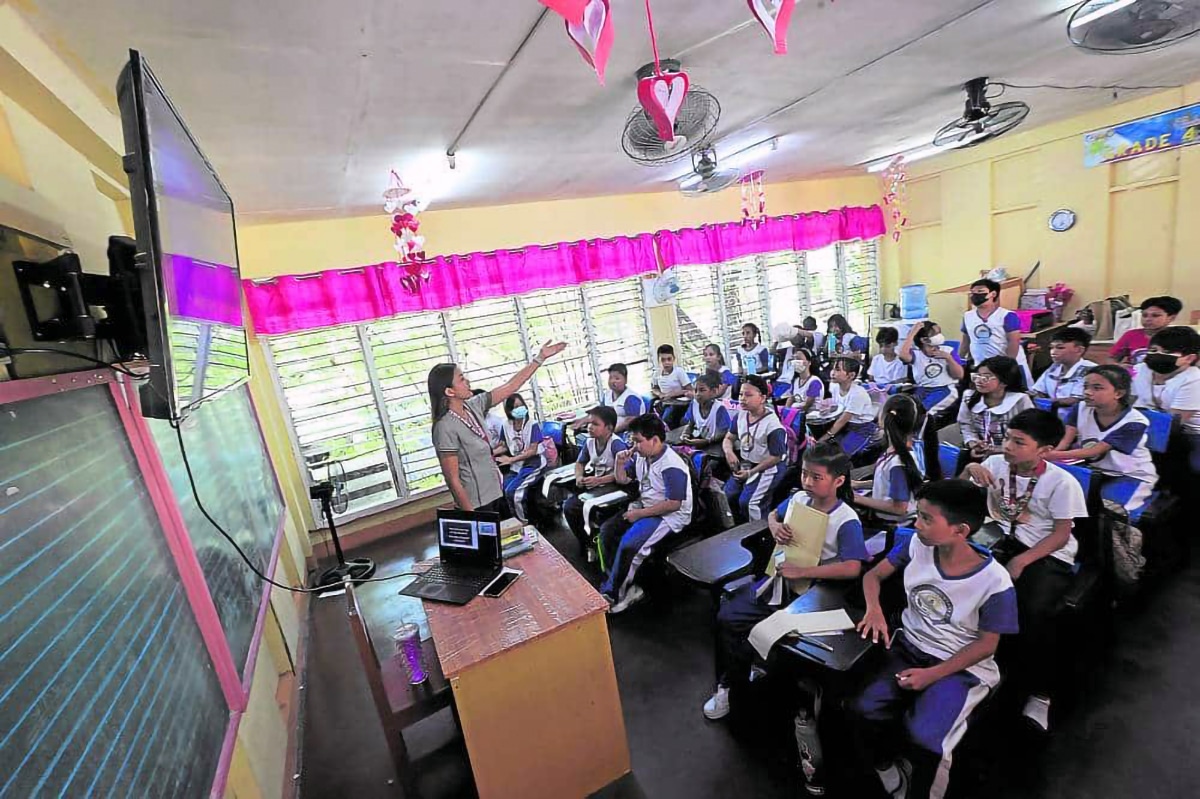Learning crisis blamed for Filipino students’ poor ‘creative thinking’

LESSON FOR THE DAY A teacher at General Roxas Elementary School in Quezon City prepares her students for the day’s lessons in this photo taken in February. An international learning assessment shows Filipino students scoring poorly in “creative thinking,” which a group attributes to a learning crisis in the country. —GRIG C. MONTEGRANDE
Filipino students’ poor score in “creative thinking,” based on the latest study of the Programme for International Student Assessment (Pisa), is a “symptom” of the decades-long learning crisis in the country, a private sector-backed education advocacy group said on Thursday.
Justine Raagas, executive director of the Philippine Business for Education (PBEd), said it was not surprising that 15-year-old Filipino students placed among the bottom five poor-performing nations in terms of creative thinking, along with Albania, Uzbekistan, Morocco, and the Dominican Republic.
READ: Filipino students rank poorly in Pisa 2022 report on creative thinking
“I don’t think we should see this as a stand-alone problem, even though it is a separate report [of Pisa]. This really speaks to the decades-old crisis in education, so, this is a symptom, similar to our learning poverty like how 10-year-olds are performing poorly in reading,” Raagas told the Inquirer.
According to the 2022 study, the creative thinking data “provide insights into how well education systems are preparing students to think outside the box in different task contexts.”
Article continues after this advertisementFor the first time, students at the age of 15 from 64 countries were also assessed on their competence to engage in generation, evaluation, and improvement of original and diverse ideas.
Article continues after this advertisementThe Philippines received a mean score of 14, well below the average of 33 points set by wealthy nations belonging to the Organization for Economic Cooperation and Development.
The top performers were Singapore, Canada, Australia, New Zealand, Estonia and Finland.
Socio-emotional skills
Raagas said the country’s bad creative thinking score was alarming, as it indicated that Filipino students were not being taught the right skills to use their imagination in finding solutions to problems.
Creative thinking skills help build students’ confidence as they determine the best way to approach a problem and learn from their mistakes, she said.
“What we need to do… is really make sure that our education system equips them, not just with the learning in the subjects, but also equip[s] them with socio-emotional skills,” she said.
In the United States, Raagas noted, there are socio-emotional learning directors in each district tasked with ensuring the enhancement of emotional learning, giving it the same importance as mathematics, science and reading.
For the Philippines, she said it was important that the government invest in the right resources to help students in terms of socio-emotional learning, on top of giving them quality instruction in this area.
“We need to make sure also that our teachers should also be equipped so they can teach the right subject matter and have them equipped if they can teach the students creative thinking, communication and working in teams,” Raagas said.
The previously released 2022 Pisa results on mathematics, science, and reading showed that the Philippines was also lagging behind the rest of the world in these subjects, showing little improvement from its 2018 assessment.
Lost continuity
Raagas said it was important that President Marcos immediately appoint a replacement for Vice President Sara Duterte, who quit her post as education secretary on Wednesday.
“I think one reason where we went wrong is that there are a lot of great plans [for our education system]. We are not short of solutions, but for the longest time, the problem here is that the continuity gets lost in the way,” Raagas said.
“And this is true for the changes in the administration, the priorities also change and the approach gets politicized,” she said.